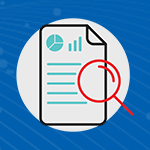Blog
6 practical use cases of AI in healthcare
Artificial Intelligence (AI) has captured the attention of nearly every stakeholder within the healthcare ecosystem, with nearly three-quarters of healthcare providers and pharmaceutical professionals who think AI will be widespread in the next three years.
How AI technologies are applied across health system workflows range from incredibly practical to incredibly complex—but nearly all use cases have a common goal of introducing greater efficiencies, better experiences, and healthier outcomes.
The rise of AI
The market size of healthcare AI is projected to increase from $28 billion in 2024 to over $180 billion in 2030. Specialties like radiology, psychiatry, and primary care are already deploying AI to help with screening, provider-patient matching, and disease diagnosis. Some solutions today are even starting to make preventative care possible, which has the potential to significantly reduce annual U.S. healthcare costs by an estimated $150 billion in the next few years.
AI growth in healthcare is substantial but unsurprising, as it has the potential to advance new, critical care delivery models and solutions, such as:
- Precision medicine – Tailoring medications or other treatments to the individual, group, or community based on their unique biological makeup and social and environmental factors that influence health will change how care is delivered and the outcomes patients will experience.
- Genetics-based solutions – Solutions that identify patterns in genetics datasets will help better identify the appropriate therapeutic targets for patients and support drug discovery and development.
- Augmented and virtual reality – These technologies will be used for healthcare education, helping train students for different specialties and surgeries at a lower cost and without involving actual patients.
Practical AI use cases
As with any new, transformative technology, AI has just as many known and unknown risks that cause healthcare stakeholders to pause. Keep in mind that deploying AI within your organization doesn’t need to happen all at once—you can (and should) start slow with practical use cases that can streamline your workflows and enhance experiences without overhauling your entire operation:
- Diagnostics and imaging – Deep learning algorithms help speed up the interpretation of complex images, increase time to disease detection, facilitate personalized treatment plans, and deliver higher-quality outcomes.
- Clinical documentation – Ambient AI scribes automatically capture provider-patient conversations to reduce provider time spent in the EHR and enable more personal, meaningful patient interactions.
- Remote monitoring – AI-powered remote patient monitoring devices can monitor patients’ vitals, such as weight, blood pressure, and heart rate, providing a clearer picture of their health so their care teams can take preventative care measures.
- Revenue cycle management – AI platforms can help revenue cycle operators increase the quantity and quality of claims processed, reduce unnecessary correspondence with payers and providers, and reduce payment denials.
- Supply chain management – Gen AI algorithms can help pinpoint sourcing needs for health systems, provide recommendations based on cost, quality, and outcomes, and help providers understand the best supplies and drugs needed for patient care.
- Patient-to-provider communications – Interactive speech technologies using interactive voice response (IVR) improve patient-to-provider communication by allowing callers to speak requests rather than key them in. The technology listens to the response, identifies the most appropriate next step, and connects the call.
Learn more
Is your organization considering starting its journey with AI? Do so with confidence by learning more about the different types of AI applications used in healthcare and the steps you should take to ready your teams and organization for AI’s continued evolution.
Download our eBook here: The Practical Guide to AI in Healthcare.






